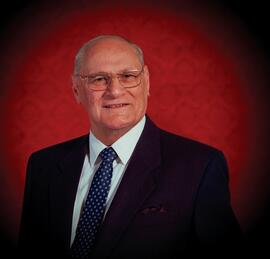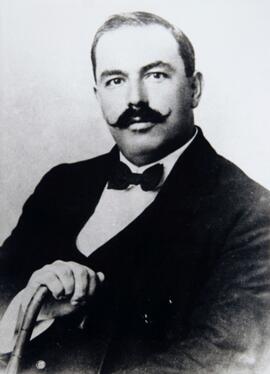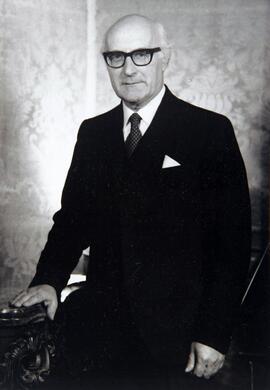Perit André Zammit was born in 1930 in Gozo, where his father was a senior civil servant. André experienced the war years in Victoria, where he received his secondary education at the Seminary, transferring to St Aloysius College in Birkirkara in 1943. He sat for his matriculation examinations and entered the Royal University of Malta to follow the course of Architect and Civil Engineer. He was the youngest of his fellow students, graduating in 1952 and then winning a government scholarship to further his studies in London in road building. Further specialisation followed in Milan.
On his return to Malta, he joined the Public Works Department and was detailed to the roads section. He was responsible for the design and execution of the first fly-over project at Blata l-Bajda in the late 1950s and several other major road construction projects.
André lectured at the Royal University of Malta and in later years, he was chairman of the Planning Area Permits Board.
He authored a number of books starting with his memoires and then the history of his family architects and a biography of his maternal uncle, Chief Justice Sir Luigi Camilleri and Our Architects – A Private Archive Unveiled, based on the Collection
He died on 14 May 2020.
Sir Alexander Wood was the son of the late Alexander Wood, (c.1750s–1807) esq an eminent member of the medical profession in Edinburgh. Sir Alexander Wood went to Ceylon on the civil establishment in 1801 and after filling the offices of member of the Council and sole Commissioner of Revenue, he returned to England in 1811. On Sir Thomas Maitland’s insistence, Wood, who had served under Maitland in Ceylon, was appointed Chief Secretary to the Government of Malta between 1815 and 1817. He was also Chief Secretary to the Government of the Ionian Islands, and up to the period of his demise was Resident Agent in England for the Ionian Islands. He was nominated a Knight Commander of St Michael and St George in 1820, and in the same year dubbed a Knight Bachelor. Sir Alexander Wood married the eldest daughter of Sir William Forbes of Pitsligo Bart, Christian Forbes, in 1807 and died on the 18th of March in 1847 at Holles Street Cavendish square.
António Manoel de Vilhena, 28 May 1663 – 10 December 1736, was a Portuguese nobleman who was the 66th Prince and Grand Master of the Order of St. John of Jerusalem from 19 June 1722 to his death in 1736. Unlike a number of the other Grand Masters, he was benevolent and popular with the Maltese people. Vilhena is mostly remembered for the founding of Floriana, the construction of Fort Manoel and the Manoel Theatre, and the renovation of the city of Mdina.
Architect Andrea Vassallo (1856-1928) was born in Luqa and died in Sliema at Zammit Clapp Hospital, a building which he himself had designed. His work includes Casa Gourgion (Mdina), numerous chapels at Addolorata Cemetery, the dome of the Siġġiewi Parish Church and the Basilica of Our Lady of Ta' Pinu in Gozo.
Vincent "Ċensu" Tabone, 30 March 1913 – 14 March 2012, was the fourth president of Malta who also served as Minister and Nationalist MP.
Rodgers joined the RAF in his late 20s and was a trained photographer, very often doing aerial photography. He also documented his time in Malta in the late 1930s through photography.
Edward Rizzo Marich, born in Valletta on the 2nd February 1890, ran the Messrs V. Marich and Co. business with his brother, Arthur Rizzo Marich, till its closure in 1959.
Arthur Rizzo Marich, born in Valletta on the 2nd July 1888, ran the Messrs V. Marich and Co. business with his brother, Edward Rizzo Marich, till its closure in 1959.
Sir Richard Plasket, early in life, filled an appointment in the Colonial Department. He was subsequently employed as private and public secretary to the government at Ceylon, Malta, and the Cape of Good Hope. He discharged the important duties of his several appointments to the satisfaction of the home government for a period of 26 years, and in consideration of his eminent services he was nominated a Knight of the Order of St. Michael and St. George, on the institution of that order in 1818.
Matteo Pérez d'Aleccio (1547–1628), Italian painter, specialized in historical, nautical, and spiritual topics during the Mannerist era. He resided in Peru for more than 40 years, from 1588 to 1628, and spent most of that time creating art.
Mons Fortunat Mizzi was a Maltese priest and the founder of the Moviment Azzjoni Socjali. He was the only child of Prime Minister Enrico Mizzi and Bice Mizzi. Mizzi was ordered a priest in 1952 and founded the Moviment Azzjoni Socjali in 1955 amongst other trade unions and cooperatives. He was a member for many years in the Church’s councils and helped in the translation of the Vatican II Council documents. In 2010, together with Prime Minister Lawrence Gonzi, Mizzi set up the Fortunato and Enrico Mizzi Foundation to administer property, archives and other memorabilia of the Mizzi Family.
Dr Enrico Mizzi was a Maltese politician, leader of the Nationalist Party from 1926 and a Prime Minister of Malta in 1950. He was born in 1885 in Valletta to Maria Sofia Folliera de Luna, the daughter of the vice-consul of Naples, and Fortunato Mizzi. Mizzi studied in Gozo Seminary, read law at the University of Rome La Sapienza and the University of Urbino, and studied literature and science at the Royal University of Malta. He married Bice Vassallo and they had one son, Dun Fortunat Mizzi.
Mizzi was first elected to the Council of Government from Gozo in 1915 as Member of the Comitato Patriottico. He was arrested at his residence on 7 May and court-martialled on charges of sedition in 1917 under the Malta Defense Regulations for writings and statements against the British. He was sentenced to a year’s imprisonment with hard labour, the loss of civil rights, and the withdrawal of the lawyer’s warrant. The sentence was commuted by Governor Methuen to a ‘severe censure’, while his civil rights and warrant were restored following the cessation of hostilities in 1918.
Mizzi founded the Circolo Giovane Malta and was life president of the Societa Dante Alighieri. He was part of the Maltese Political Union coalition, whom he split and formed the Democratic Nationalist Party / Partito Democratico Nazionalista (PDM) to contest the elections for Malta’s first self Government. Later the PDN merged with the Maltese Political Union / Unione Politica Maltese (UPM) to form the Partit Nazzjonalista (PN). He was co-leader of the PN with Sir Ugo P. Mifsud (1926-1942).
On 30 May 1940, he was arrested and deported to Uganda, with another 47 Maltese people, where he remained in close contact with other members of the Partit Nazzjonalista. In 1945, the exiled persons, including Mizzi, were allowed back to Malta, where he re-entered politics and reorganised the PN. At the 1950 elections, Mizzi was appointed Prime Minister but he died three months later on the 20th December.
Bice Mizzi nee Vassallo was a Maltese pianist, considered among the foremost pianists of her generation. She is the daughter of composer Paolino Vassallo and Maria Anna nee Grech, and the wife of former Maltese Prime Minister Enrico Mizzi. Her first notable performance was in 1909 where she performed a recital at the Manoel Theatre under the patronage of the Bishop of Malta Pietro Pace, organised in aid of the Sisters of St. Joseph, Sliema. She also performed a recital at Wigmore Hall in London and performed at a concert by Maltese composer Carmelo Pace in 1946. Mizzi had a son, Dun Fortunat Mizzi. She died in 1985.
Vincenzo Marich, born circa 1813, registered the business, known today as V. Marich and Co., in 1838. Vinenzo was marrier to Natalizia Lo Re (Lore) and had no children of their own. By 1862, the business received its first appointment by His Royal Highness, the Prince of Wales in 1862, where permission to affix "By appointment to His Royal Highness, the Prince of Wales" over the door of their establishment was granted. Vincenzo probably retired from the business around 1864, handing over the business to Lawrence Rizzo Marich.
Lawrence Rizzo Marich, who was the first cousin, once removed of Vincenzo Marich, was first involved in the business as an apprentice to help in the daily running of the business. By the time the business was handed over to Lawrence, the company had taken the new established name V. Marich and Co. since the first mention of this company was in the mid-1860s.
Anthony J. Mamo was born in Birkirkara on 8 January 1909 from Joseph Mamo and Carla Brincat. Educated at the Archibishop’s Seminary and later at the Royal University of Malta where, in 1931, he graduated as Bachelor of Arts (B.A) and in 1934, as Doctor of Laws (LL.D). As the first student in the course he was awarded the Government "Travelling Scholarship" and the "Bugeja Scholarship". He had short courses at London University and University of Perugia.
In October 1936 he was appointed member of the Commission which, under the chairmanship of Judge Harding, was entrusted with the task of preparing a Revised Edition of all the Laws of Malta.
During the Second World War he gave his services for refugee work and general service.
In 1942 Dr Mamo entered the Attorney-General's Office as one of the Crown Counsel. Here he occupied in succession all the grades (1950-52 – Senior Crow Counsel), until he himself became Attorney-General in 1955.
In the same period, from 1943 to 1957 he became Professor of Criminal Law at the University of Malta where for many here he was member of the Senate and President of the University Council.
Anthony Mamo served as chief legal adviser under 4 Prime Ministers: Sir Paul Boffa, Dr Enrico Mizzi, Dr Gorg Borg Olivier, Dominic Mintoff. and he accompanied all Ministerial delegations for discussions and negotiations with the British Government.
From 1957 to 1971 he was appointed as Chief Justice and president of the Court Appeal.
Towards the end of June 1962, Acting Governor pending the arrival of the new British governor, Sir Maurice Dorman.
In 1964 he was the First President of the Constitutional Court and in 1967 the First President of the Court of Criminal Appeals.
From 1971 to 1974, he was appointed as the first Maltese Governor-General.
When Malta was proclaimed a Republic in 1974, he was elected by the Parliament as the first President of Malta (13th December1974 - 26th December 1976).
Honors:
1955 – Officer of the Order of the British Empire (Commonwealth Honors).
1957 – Honorary Queen’s Counsel (Commonwealth Honors).
1960 - Knight Bachelor
1962 – Knight of Grace of the Venerable Order of St John.
06 April 1990 – Companion of Honor of the National Order of Merit by right as a former President of Malta.
Ian Colin Lochhead, author of 'Siege of Malta, 1565'.
Francis Laing was born at Edinburgh on 1 May 1773, son of Alexander, an architect. Laing studied at the University of Edinburgh 1789-90 and 1792-93, and the University of Glasgow in 1794, taking a Physics class under John Anderson. He was Snell Exhibitioner in 1796, and went on to graduate BA from Oxford in 1799 and MA in 1801. He took Holy Orders, becoming Reverend Francis Laing. In 1803 Laing served as Private Secretary to the Governor of Malta, and was shortly afterwards appointed Secretary to the Government of the Island, a post which he held till 1814. Returning to the UK, Laing was Rector of Llanmaes, Glamorgan from 1814 to 1824, and Rector of Humshaugh, Northumberland, from 1820 to 1832. He died at the Mythe, Tewkesbury, on 24 November 1861.
Hart worked as Chief Architect in the Edinburgh City Architecture Department in Scotland. When he came to Malta he also visited Gozo and Comino, and several sites within the Islands between the 1950s and 1980s.
Sir Frederick Hankey GCMG (13 March 1774 – 13 March 1855) was a British army officer, diplomat and colonial administrator. Hankey, born in London, married his first cousin, Charlotte Hankey, at Fetcham, Surrey, in July 1796. They had two daughters, Emma (1798-1864) and Frederica (1816-1872). Charlotte Hankey died that same year 1816. Hankey remarried in December 1818 with a woman from Corfu, Mrs Catterina (or Catherine) Valarmo, Vaslamo or Varlamo, with who he had Thomasina-Ionia (1819-1900). Frederick Hankey served in the British Army in Ceylon (1800-1811) as an infantry officer (he attained the rank of colonel in the 15th Regiment of Foot). He then became private secretary of Sir Thomas Maitland. Hankey served in Malta from 1824 to 1837. He achieved great respect for a sensitive diplomatic mission to the Vatican about the legal immunity that the Roman Catholic Church enjoyed on the Island of Malta. In particular Naples' claim that he had the right to nominate any Bishops of Malta. The Vatican would eventually come down on the side of the British, thanks in large part to Hankey's diplomatic intervention with Rome. In 1833 he was awarded the Grand Cross of the Order of St Michael and St George by William IV. Sir Frederick Hankey died in London in 1855 on his 81st birthday.
Herbert Grech served as Commissioner of Police from 1951 till November 1954.



